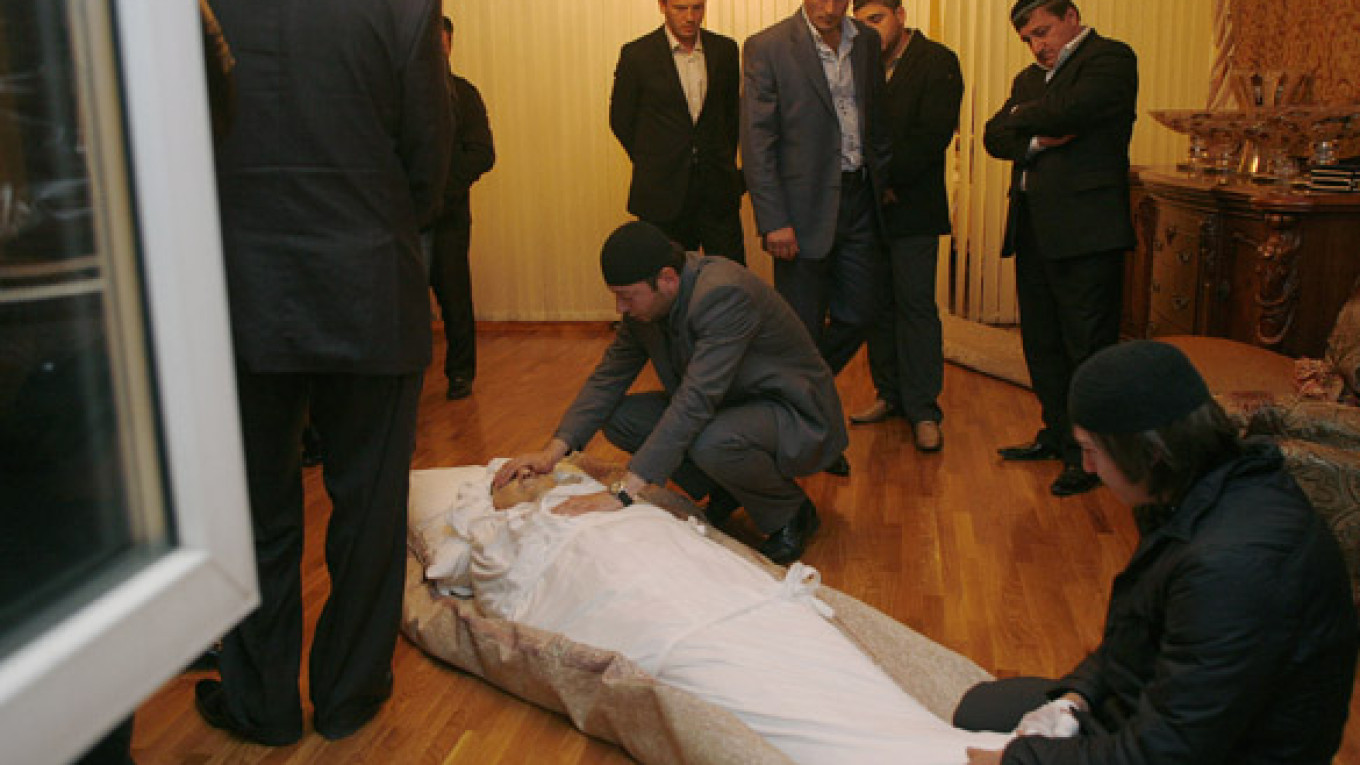SURKHAKHI, Ingushetia — More than 3,000 people gathered Monday in Ingushetia to bury an opposition activist whose murder rights groups say has underlined the slide into violence across the North Caucasus.
Maksharip Aushev, 43, who campaigned against what he said were abductions by the security forces, died at the wheel of his car after his vehicle was peppered with bullets as he drove to visit relatives in the nearby republic of Kabardino-Balkaria.
Mourners gathered in drizzle at a graveyard by a small mosque in the village of Surkhakhi, about 10 kilometers outside Ingushetia’s biggest city, Nazran, to bury Aushev.
Wailing men gently lowered Aushev’s body, tightly covered in a white sheet, into the moist ground before planting a tombstone with his name in both Arabic and Russian.
“The situation is so bad that it simply cannot get any worse after the murder of Maksharip. This is the absolute limit,” said Bakha Chapanov, a 51-year-old journalist in Nazran.
His murder on Sunday came just over a year after his friend, reporter Magomed Yevloyev, was killed in police custody in Ingushetia. Yevloyev’s parents have since said they have lodged an appeal with Europe’s human rights court after previous cases at home collapsed.
Rights groups called on Russian leaders to condemn Aushev’s murder and ensure those responsible were brought to justice.
“There needs to be a clear condemnation of this kind of killing by the Russian leadership because what happens at the highest level sends a signal to those below,” said Allison Gill, the Russia director of Human Rights Watch.
Sarah Mendelson, director of the Human Rights and Security Initiative at the U.S.-based Center for Strategic and International Studies, said international dialogue was key. “Until you have senior government officials in the U.S. and various European capitals talk about what’s going on in the North Caucasus, you’re not going to see any international justice,” she said.
There has been no Kremlin reaction to the killing so far. At least four campaigners have been killed so far this year. On Jan. 19, Stanislav Markelov, a lawyer acting for the family of a Chechen girl murdered by a Russian army colonel, was shot in central Moscow. On July 15, Chechen activist Natalya Estemirova was murdered by unknown assailants. In August, Zarema Sadulayeva, head of a Chechen children’s charity, and her husband, Alik Dzhabrailov, were found shot dead in the trunk of a car.
Aushev, who was from a prominent Ingush family and had a flourishing construction business, dived into local politics in 2007 by leading a campaign against the republic’s security services, which he blamed for the abduction of his son and nephew.
The Kremlin removed former Ingush leader Murat Zyazikov, whom Aushev publicly opposed, in October 2008 and replaced him with Yunus-Bek Yevkurov, with whom Aushev had good relations. Yevkurov was badly injured in an attempt on his life in June.
Yevkurov on Monday visited the Aushev family’s house in Nazran to pay his condolences, a rare sign of respect for a rights campaigner by a leader in the region. He vowed to take the investigation under his personal control.
But residents said Yevkurov must put an end to killings in Ingushetia.
“We need to stop this outrageous shooting of people. If Yevkurov cannot fight this, then he must say so and leave his post,” said Akhmed, a 42-year-old resident of Ingushetia who declined to give his surname.
A Message from The Moscow Times:
Dear readers,
We are facing unprecedented challenges. Russia's Prosecutor General's Office has designated The Moscow Times as an "undesirable" organization, criminalizing our work and putting our staff at risk of prosecution. This follows our earlier unjust labeling as a "foreign agent."
These actions are direct attempts to silence independent journalism in Russia. The authorities claim our work "discredits the decisions of the Russian leadership." We see things differently: we strive to provide accurate, unbiased reporting on Russia.
We, the journalists of The Moscow Times, refuse to be silenced. But to continue our work, we need your help.
Your support, no matter how small, makes a world of difference. If you can, please support us monthly starting from just $2. It's quick to set up, and every contribution makes a significant impact.
By supporting The Moscow Times, you're defending open, independent journalism in the face of repression. Thank you for standing with us.
Remind me later.


